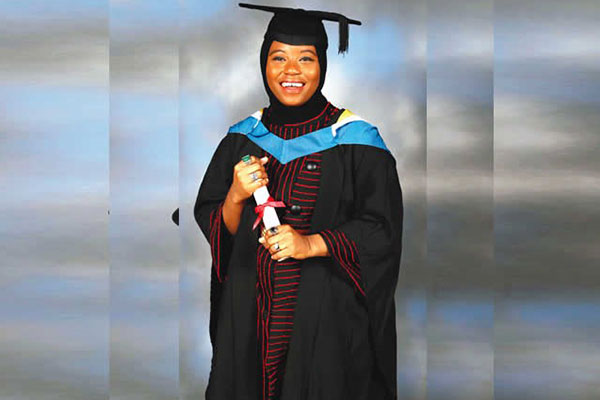Asmah Mansur-Williams graduated from Bournemouth University, United Kingdom with a first class in International Business Studies. she expresses her delight over the feat, her plans for the future and her experience in the foreign institution
Would you say making first class was dream come true for you or hard work paid off?
I would say it was an unconscious plan, but without doubt, it also takes God for dreams to come true. It was definitely challenging but then it was amazing navigating through all the difficulties to still attain success at the end. For me, making a first-class degree is a validation that at the end, dreams do come true and Allah listens if you truly put your heart to it.
Were there times you almost got fed up with the much efforts you had to put in?
None that I can recall; success creates a good feeling and it makes you to forget a lot of the struggles that went into it. Of course, there was a price to pay to maintain a good result. Having assignments at intervals actually helped me to know when I wasn’t sustaining the tempo and areas where I needed to get better. My relationship with my family also helped; just one call away and I got all the support and encouragement I needed. I also made sure I never got too comfortable; I didn’t shy away from learning and I made sure I always had the drive to do more and that mindset helped me. I believe the little practical things made a difference; like getting acquainted with tutors, attending classes and psychologically developing an enduring relationship with Allah. Beyond school work, I knew I needed to maximise my time there, so I had to engage with people in the community and learn from them. Success is a lot more than degrees but how versed you are. There is so much to learn than the lecture room can offer.
Apart from the joy of making first class, what were your other memorable moments?
I had a lot of happy moments, but I guess the saddest moment should be when I was leaving my family for the first time and subsequently leaving my sister, because we had done many things together from the start, so, that was a hard one to swallow.
At what point did you travel abroad for your studies?
It was after my secondary education.
Would you mind sharing what informed that decision?
My parents schooled in the UK and they seem to have had better experiences there, especially leaving their comfort zone, so I embraced the idea too. I guess it’s better to see something for yourself than hear people talk about it. On getting there, I first attended Boston College for the Access to Higher Education Diploma before I proceeded to Bournemouth University.
What were the things you found amazing about the educational system there?
The teaching there is a lot more engaging and that is what you get when tutors have passion for their jobs, and my belief is that the system plays a part in their delivery system. Also, tutors are very accessible there and that is crucial to the success of teaching. It’s a two-way learning, whereas in Nigeria, things can get too diplomatic and hierarchical.
Does that system make having first class easier?
Without playing the pity card, international students face a number of barriers that I have actually seen firsthand, and it psychologically affects one’s mindset. It can definitely be a hindrance to getting a good degree. ‘Home is where the heart is’ isn’t a vain saying, because being outside one’s comfort zone definitely comes with its challenges. I think ultimately it’s really up to the individual and what their goals are. It might sound like a cliché, but truly if you put your heart to it, you would achieve success at any cost regardless of where you are. I would place my success down to hard work, self discipline and having faith. It felt quite easy to pray to Allah for success after putting in hard work and all I needed was His blessing. Also, I always made sure to keep in touch with my parents, informing them of every achievement as I went on. It was rewarding seeing their positive reaction per time.
Were there challenges that you faced as a foreign student?
Quite a number of them. You learn very easily to be your own support system while navigating your new environment. Culture is beautiful but some can be strange. Also, the weather was not a joke. However, being in a new place opens you to a lot of wonderful opportunities that almost void the challenges.
Were there times you felt homesick?
A lot, especially within the first year after I left my sister. I used to cry every day and my dad, may God continue to bless him, would say to me ‘do you want me to leave everything here and come stay with you’, and I could feel the sadness of my parents because of the distance apart. So, I had to get stronger, but it all became bearable including the cold, long winters. I am eternally grateful to my parents for all they have done, even till now.
Were there times you missed the local food at home?
All the time! I attempted to cook a few times but let’s say nothing beats local food cooked on Nigerian soil. Absolutely nothing.
International Business Studies doesn’t sound like a very popular course that comes into mind when students want to make a choice. What influenced your choice?
At that time, it was a vague idea but a safe one, especially seeing the achievements of my parents in business. But instead of business management, I wanted to explore business marketing, hence I chose the course, but interestingly, I ended up studying International Business and Marketing which is actually an interesting pathway. As we progressed, I realised the importance of developing a broader knowledge of the business environment while also gaining an understanding of a specific field peculiar to the business sector. My three years of studying and a year in the industry, which was such an amazing opportunity, was an exciting experience. University is such a perfect place to be well rounded.
Did you get involved in other school activities?
I was able to do variety of things. I was volunteer leader in my second year and fashion editor of the university’s magazine in my final year. I actually won an award as the best fashion writer. Initially, I was a writer for the magazine, but it felt right to take leadership position in my final year. I also taught myself photography, graphic design and I perfected my sewing skill. So, I had a number of things that kept me busy. Getting involved with the locals also provided opportunities and amazing projects that always kept me busy. In fact, I was awarded the coveted Student Development Award in recognition of my hard work and commitment and the award came a year after honing my photography skills at an event as the official photographer. University is an interesting place with a lot of things going on. I did partake in a lot of activities in the university. Besides my lectures and meeting with my editorial team, I volunteered for some activities and travelled into town for photography gigs. Occasionally, I gave myself good treat, like having a lot of rest, going for TV shows, especially when an assessment had just been released. I also love my sleep and my time alone, being an introvert, but I was able to build good relationship with other students. Initially, it was quite hard, especially since we were all from diverse culture and background, but as soon as I reconciled myself with the uniqueness of each person’s background, I started seeing the beauty in all that difference and the relationship became worthwhile.
What reading style worked for you?
I didn’t have a schedule. Basically, studying depended on my workload. There were days I didn’t study and there were weeks I kept studying. It varied. I wasn’t a nocturnal person, so time management played a role, which I was mindful of, and waking up early actually helped to maximise the hours of the day. I’m not the most organised and tactful, so I didn’t overly plan my reading or had crazy targets. I only knew I had to give everything 100 per cent and I worked at that pace. With the kind of successful parents that I had, I couldn’t but take things seriously, because they expect nothing less from me.
With all the tact, how would you have felt if you didn’t make first class?
I guess I’ll never know! Alhamdulillah.
Is there anything you would have loved to do as a student that you could not do?
Have more fun. I think I took things too seriously and wanted to achieve so much within a short span that I forgot to be young. But I guess I still have the rest of my life to be young.
Where would you like to work?
A place I can utilise my full potential Insha Allah. I have Level five CMI Diploma in Chartered Management, so, I know there are opportunities that await me because beyond the degrees, I have equipped myself with relevant skills. However, there is still a lot to be done, as I’m now preparing for my Master’s in Digital Media Management, and at this stage, I am more than excited to see how life unfolds.
What is the one thing you would advise students to do or run away from?
Apart from putting in a fair share of hard work, a less generic advice from me would be for them not to yield to self doubt. If there’s anything I’ve learnt, it is the importance of believing in oneself, something my parents always advise. I could have achieved much more if I was brave enough to put all my doubts away early enough, and it’s scary how your mind can affect what you can become. So, sustain positive thinking and you’ll be just fine.
What fond memories of your growing up would you likely not forget?
Having such close-knit mates in secondary school, we were all like family and it was beautiful. I was born in Lagos and I attended FIEF Academy, Lagos for all my elementary, primary and secondary education. I wasn’t sporty, but I did love table tennis tournaments because I was so good at the game and I won a few. I held various notable positions while in school, and I was particularly known for reviving the academy’s press club as editor-in-chief. I was also the head girl at some point. Going forward, just like I said in my speech at the British Conference of Undergraduate Research where I explored the influence of religion on consumer’s fashion choices, I plan to continue pursuing my interest in the modest fashion industry particularly in Nigeria. There is a lot of confidence that comes when you wear clothes that resonate with you, and for some Muslim girls, that confidence is still far-fetched due to the lack of significant brands catering to this segment.











